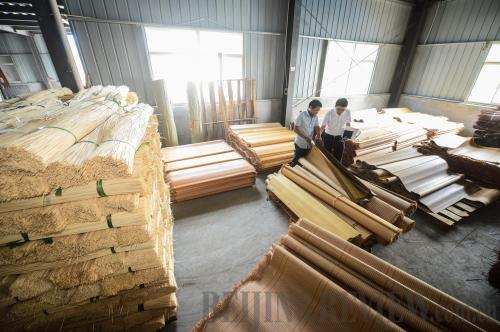|
 |
|
MATS FOR MONEY: Staff members from a local bank check products that a bamboo processing company uses as collateral for loans in Anji, east China's Zhejiang Province, on June 19 (XU YU) |
At the tender age of 29, Zhao Xin is already a business partner and managing director of a startup company developing online and mobile games. Based in north China's Tianjin, the company employs more than 180 staff and is seeing a surging user base and satisfying profit data. But even so, getting loans from banks appears to be mission impossible for the company.
"Although the Chinese Government has been reiterating its support for cultural companies, it's still extremely difficult for us to get bank loans. Banks would rather lend to manufacturing businesses running at a loss than lending to light-asset companies that are performing well, simply because the former have factories and production lines as collateral," Zhao said.
"If my company wants to get loans from banks, we have to rely on intermediary guarantee companies that charge high commission rates (about 2-3 percent) and 20 percent of the loan as deposits. This greatly increases our borrowing costs," Zhao added.
Therefore, investment in the company mainly comes from its founders and private equity companies, Zhao said.
There seems to be a paradox prevailing in the world's second largest economy—on the one hand, money and credit supply are more than sufficient on a macro scale; while on the other side of the equation, small and medium-sized enterprises (SMEs) like Zhao's game company still have great difficulty accessing funds.
To that end, the State Council released a 10-point guideline on August 14 in an attempt to lower borrowing costs for businesses, SMEs in particular.
The document came in the wake of a plunge in newly added loans in July when yuan-denominated loans saw the lowest monthly increase since December 2009.
"Authorities want to renew market confidence by releasing the guidelines immediately after July's sluggish lending data. Lowering borrowing costs for businesses has become quite an urgent task," said Lu Zhengwei, chief economist with the Industrial Bank.
By summarizing the tasks brought forward by previous conferences of the State Council, the guideline has also specified the government departments responsible for those tasks.
"However, the guideline tries to address the symptoms, rather than curing the disease itself," Lu warned.
Even the guideline itself admits that, in the long run, the cost of borrowing can only be reduced by reforms and economic restructuring.
Why so difficult?
Small and micro companies have played a vital role in the economy, as they are a major job creator and a leading force in China's efforts to build an innovation-driven economy. However, they face many obstacles in getting funding.
The difficulty SMEs face in financing is a universal problem, said Yi Xianrong, a research fellow with the Institute of Finance and Banking at the Chinese Academy of Social Sciences.
"In any market economy, before banks decide to lend to a company, they evaluate and price the company's risks. Since SMEs are mostly in the initial phase of their development, they are in an unfavorable position in terms of financial conditions and collateral assets. Even if banks were willing to lend to them, the interest rate would be much higher than for big companies, because there are more inherent risks. This is totally understandable," Yi said. "Therefore, many countries have introduced preferential lending policies for SMEs, especially small and micro companies."
The problem is more pronounced in China than in other countries, he said. In China, state-owned enterprises (SOEs) have the easiest access to cheap loans from banks. Meanwhile, a large amount of fund has flooded into the red-hot property sector following years of price upsurge, pushing up the overall cost of borrowing.
A source from the Industrial and Commercial Bank of China (ICBC) told Beijing Review that as downstream suppliers, SMEs are often bullied by upper-stream SOEs.
"When they bid to be suppliers for large SOEs, the bidding price can be very low, which requires SMEs to do a fantastic job in cost control and leads to very thin profits," he said. "After they win the bidding and manage to deliver good-quality goods or services in time, the large SOEs often don't comply with the contract they have signed. Sometimes, they delay the payment for over a year, leading to severe cash shortage in SMEs."
Shan Xiangshuang, Board Chairman of China Science and Merchants Capital Management, said a misallocation of financial assets is another reason for the high cost of borrowing for small and micro companies.
Official data show that China's total financial assets reached 180 trillion yuan ($29.32 trillion) in 2013 and 90 percent of that belongs to banks, while in the more advanced financial systems of the EU and the United States, banking assets only account for 60 percent of the total.
The 10-point guideline stipulates the government will accelerate the development of private equity and venture capital to lower the cost of borrowing for small and micro companies.
| 